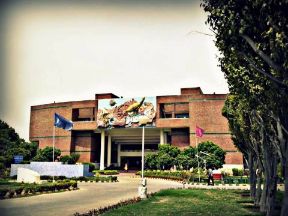| Mammalian Cell Culture Laboratory |
The Mammalian Cell Culture Technology laboratory is being developed at Department of BSE, NSUT, for generation of recombinant therapeutics, especially bispecific antibodies using mammalian expression vectors, with a feasibility of switchable heavy and light chain variable regions. Expression strategies being designed will generate novel combinations of bispecific antibodies targeting various cancers, autoimmune diseases, and inflammatory disorders. |
|
| Biochemistry and Enzyme Technology Lab |
Biochemistry and enzymology labs play a crucial role in advancing our understanding of biological processes at the molecular level. The objective of the lab is to provide foundational knowledge of enzyme kinetics, activity regulation, and biochemical analysis, essential for further studies in biochemistry and enzymology. |
|
| Bioinformatics facility |
It is a newly developed, fully air-conditioned facility with seating for 35 students. At present there are 30 all-in-one i7 computers with wi-fi and power backup. The facility uses open-source software for conducting UG and PG Bioinformatics practical. A drug designing software was also recently purchased. Development of advanced computing capabilities is under process. |
|
| Bioprocess Technology Laboratory |
The laboratory is working on different emerging technologies in bioprocesses and bio-products to advance and synergize innovation systems related to bioprocessing for development of value-added products. The objective is to lead a knowledge-based bio-processing mission through translational testing, optimization and up-scaling existing technologies. |
|
| Computational and Structural Biology Laboratory |
Students learn and use a range of computational techniques in Sequence/Structural Bioinformatics, Modeling/simulation of Biomolecular interactions, Drug target selection, Drug
design, Network Biology as well as Computational Genomics and proteomics. The research focus is on cardiovascular disease in humans as well as Stress response in bacteria. The laboratory has attracted external funding for research projects and scholars. The laboratory is equipped with computers, workstation and internet facilities. Commercial SybylX software is available. Additional open-source software like Cytoscape, Autodock, Deepview, Splitstree, Gromacs, and Amber are also used.
|
|
| Bioengineering Laboratory |
The objective of a Bioengineering laboratory is to provide facilities to build concept of engineering knowledge required for biotechnology students by hands-on experiments. The laboratory is well equipped with instruments and various laboratory experiments of both undergraduate and post graduate courses are conducted in each semester.
Apart from this under graduate students are also used to conduct their experiments required for their final year projects such as fuel cell, fermentation, biomass conversion, algae cultivation etc. in this laboratory.
|
|
| Biosciences Laboratory |
Bioscience Lab has facilities for training students in Cell Biology, Biochemistry, Microbiology, Molecular Biology, Genetics, Structural Biology, Methods and Instrumentation in Biotechnology, Immunology, Enzymology, Recombinant DNA Technology, Plant/Animal Biotechnology and
Genomics/Proteomics. The laboratory is equipped with Weighing Balance, Vortex, Mixer, Grinder, Horizontal and Vertical Electrophoresis Unit with Power pack, Magnetic stirrer, pH meter, Autoclave, Hot Air Oven, Cold storage facility Microfuge centrifuge, Laminar air flow workbenches, Heating plate, Microscopes etc.
|
|
| Departmental Instrumentation Facility (DIF) |
The Departmental Instrumentation Facility in the BSE Division is a central research facility, which caters to the requirements of research scholars and faculty of the division. The lab has facility to conduct research work in varied areas such as Applied Microbiology, Recombinant DNA Technology, Structural Biology, Genomics & Proteomics and Nanotechnology. Equipment’s available in DIF lab are Biologic LP for Protein Purification, Gel Doc, Fermenter, Bench-top Centrifuge, Refrigerated Centrifuge, Mini Centrifuge, Freezer (-20°C), Bacteriological Incubators, Shaker Incubator, Oven, Autoclave, Milli-Q Water Purification System, Gel Rocker, Gel Electrophoresis Unit (Vertical, Horizontal), Vortex Mixer, Magnetic Stirrer, Hot Plate, Laminar Room of BSL-2 level and other basic amenities. |
|
| Molecular Microbiology and Drug Discovery Laboratory |
The laboratory is equipped with state-of-the-art infrastructure to carry out research work in drug discovery. Various equipment, for example, Rotary Evaporator, Agela Octopus Chromatography System, HPLC, Multimode Reader and UV-Visible Spectrophotometer make up the existing facilities of the lab. Fourier Transform Infra-Red Spectrophotometer is expected to arrive soon. The aims and objectives of DDL assume significance in view of Anti-microbial Resistance (AMR) that has been recognized as a serious threat to human health for India and the world. |
|
| Hydroponics facility |
The Centre of Excellence, "Hydroponic Horticulture Training and Research Facility", an initiative aimed at advancing training and research in production of horticulture crops had been established at NSUT, Main Campus with funding support from Delhi Knowledge Development Foundation (DKDF), which is poised to lead towards excellence in hydroponic education and innovation. The facility, covering an area of 709 square meters, boasts a state-of-the-art setup designed to accommodate various training and research activities. Key features include a classroom designed to accommodate 30 students for theoretical sessions on hydroponics, a polyhouse equipped with five distinct hydroponic systems tailored to different groups of horticultural plants, with different kind of set ups and a dedicated area for plant germination. The primary goals of the Hydroponic Horticulture Facility are to establish a premier training and research hub, empower aspiring entrepreneurs and local farmers with the skills needed to set up, operate, and maintain hydroponic horticulture systems, focus on researching and developing innovative hydroponic cultivation methods for new horticultural crops, and build an ecosystem that significantly contributes to pollution control, water conservation, and the supply of fresh, healthy produce to the local community.
|
|




